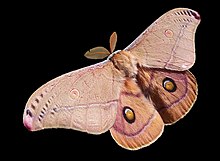ցեց
Armenian[edit]

Etymology[edit]
From Old Armenian ցեց (cʻecʻ).
Pronunciation[edit]
- (Eastern Armenian, standard) IPA(key): [t͡sʰet͡sʰ]
- (Western Armenian, standard) IPA(key): [t͡sʰet͡sʰ]
Audio (Eastern Armenian) (file)
Noun[edit]
ցեց • (cʻecʻ)
- moth
- Synonym: մղմող (mġmoġ)
- a kind of skin disease
- (figuratively) something or someone who oppresses, exploits, consumes or spoils something or someone
- (figuratively) restless person
Declension[edit]
| singular | plural | |||
|---|---|---|---|---|
| nominative | ցեց (cʻecʻ) | ցեցեր (cʻecʻer) | ||
| dative | ցեցի (cʻecʻi) | ցեցերի (cʻecʻeri) | ||
| ablative | ցեցից (cʻecʻicʻ) | ցեցերից (cʻecʻericʻ) | ||
| instrumental | ցեցով (cʻecʻov) | ցեցերով (cʻecʻerov) | ||
| locative | — | — | ||
| definite forms | ||||
| nominative | ցեցը/ցեցն (cʻecʻə/cʻecʻn) | ցեցերը/ցեցերն (cʻecʻerə/cʻecʻern) | ||
| dative | ցեցին (cʻecʻin) | ցեցերին (cʻecʻerin) | ||
| 1st person possessive forms (my) | ||||
| nominative | ցեցս (cʻecʻs) | ցեցերս (cʻecʻers) | ||
| dative | ցեցիս (cʻecʻis) | ցեցերիս (cʻecʻeris) | ||
| ablative | ցեցիցս (cʻecʻicʻs) | ցեցերիցս (cʻecʻericʻs) | ||
| instrumental | ցեցովս (cʻecʻovs) | ցեցերովս (cʻecʻerovs) | ||
| locative | — | — | ||
| 2nd person possessive forms (your) | ||||
| nominative | ցեցդ (cʻecʻd) | ցեցերդ (cʻecʻerd) | ||
| dative | ցեցիդ (cʻecʻid) | ցեցերիդ (cʻecʻerid) | ||
| ablative | ցեցիցդ (cʻecʻicʻd) | ցեցերիցդ (cʻecʻericʻd) | ||
| instrumental | ցեցովդ (cʻecʻovd) | ցեցերովդ (cʻecʻerovd) | ||
| locative | — | — | ||
Old Armenian[edit]
Etymology[edit]
The origin is uncertain. Similar words for moth are found in neighbouring languages: Udi цӏецӏ (c̣ec̣), Proto-Georgian-Zan *c₁ic₁-, Akkadian 𒌨𒈨 (sāsu), Classical Syriac ܣܣܐ (sāsā), Ancient Greek σής (sḗs) etc. The Armenian is often considered a Semitic borrowing, even though Semitic s is incompatible with Armenian ց (cʻ). To overcome this problem, Ačaṙean assumes derivation from Akkadian 𒍝𒀀𒍮 (ṣāṣu), a supposed emphatic form of the more common 𒌨𒈨 (/sāsu/); however, the existence of this alternative emphatic form found in Muss-Arnolt but not in more recent references is in doubt.
We may be dealing with independent expressive formations for insects in various languages, like in the case of ճճի (čči).
Noun[edit]
ցեց • (cʻecʻ)
Declension[edit]
Derived terms[edit]
- ցեցակեր (cʻecʻaker)
- ցեցակերեալ (cʻecʻakereal)
- ցեցամէց (cʻecʻamēcʻ)
Descendants[edit]
- Armenian: ցեց (cʻecʻ)
References[edit]
- Ačaṙean, Hračʻeay (1979) “ցեց”, in Hayerēn armatakan baṙaran [Armenian Etymological Dictionary] (in Armenian), 2nd edition, a reprint of the original 1926–1935 seven-volume edition, volume IV, Yerevan: University Press, pages 453–454
- Awetikʻean, G., Siwrmēlean, X., Awgerean, M. (1836–1837) “ցեց”, in Nor baṙgirkʻ haykazean lezui [New Dictionary of the Armenian Language] (in Old Armenian), Venice: S. Lazarus Armenian Academy
- Hübschmann, Heinrich (1892) “Die semitischen Lehnwörter im Altarmenischen”, in Zeitschrift der Deutschen Morgenländischen Gesellschaft[1] (in German), volume 46, page 251
- Hübschmann, Heinrich (1897) Armenische Grammatik. 1. Theil: Armenische Etymologie (in German), Leipzig: Breitkopf & Härtel, page 317
- Muss-Arnolt, William (1905) A Concise Dictionary of the Assyrian Language, volume II, Berlin: Reuther & Reichard, page 887b
- Nikolaev, Sergei L., Starostin, Sergei A. (1994) “*miʒ_Ă / *ʒ_imiʒĂ”, in A North Caucasian Etymological Dictionary[2], Moscow: Asterisk Publishers
- Olsen, Birgit Anette (1999) The noun in Biblical Armenian: origin and word-formation: with special emphasis on the Indo-European heritage (Trends in linguistics. Studies and monographs; 119), Berlin, New York: Mouton de Gruyter, page 939
- Petrosean, Matatʻeay (1879) “ցեց”, in Nor Baṙagirkʻ Hay-Angliarēn [New Dictionary Armenian–English], Venice: S. Lazarus Armenian Academy
- Schulze, Wolfgang (2001) The Udi Gospels: Annotated Text, Etymological Index, Lemmatized Concordance (Languages of the World/Text Library; 5)[3], Munich: Lincom Europa, page 264b
- Zimmern, Heinrich (1915) Akkadische Fremdwörter als Beweis für babylonischen Kultureinfluss (in German), Leipzig: A. Edelmann, page 52
- Armenian terms inherited from Old Armenian
- Armenian terms derived from Old Armenian
- Armenian terms with IPA pronunciation
- Armenian terms with audio links
- Armenian lemmas
- Armenian nouns
- Armenian palindromes
- hy:Moths
- hy:Diseases
- Old Armenian terms with unknown etymologies
- Old Armenian lemmas
- Old Armenian nouns
- Old Armenian palindromes
- xcl:Diseases
- Old Armenian ideophones
- xcl:Moths